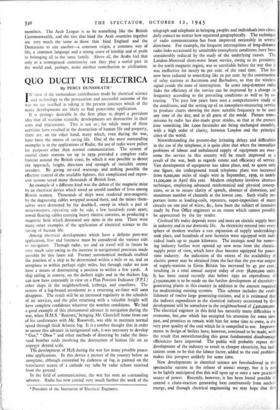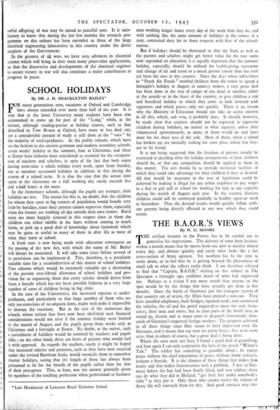QUO DUCIT VIS ELECTRICA
By PERCY DUNSHEATH • N view of the tremendous contribution made by electrical science I and technology to the prosecution and successful outcome of the war we are justified in asking at the present juncture which of the many developments are likely to find peace-time application. It is perhaps desirable in the first place to dispel a prevalent idea that all wartime scientific developments are destructive in their aims and attainments. This is not so ; for while many of these activities have resulted in the destruction of human life and property, there are, on the other hand, many which, even during the war, have been the means of saving life. One of the most outstanding examples is in the applications of Radar, the use of radio wave pulses for purposes other than normal communication. The system of coastal chain stations set up in 1939 provided a complete radio frontier around the British coast, by which it was possible to detect the approach, height, direction and strength of invisible enemy invaders. By giving air-raid warnings and making possible the effective control of the available fighters, this complicated and expen- sive system saved many thousands of British lives.
An example of a different kind was the defeat of the magnetic mine by an electrical device which saved an untold number of lives among British seamen. Thousands of ships were rendered non-magnetic by the degaussing cables wrapped around them, and the mines them- selves were destroyed by the double-L sweep in which a pair of minesweepers, operating side by side, a few hundreds yards apart, towed floating cables carrying heavy electric currents, so producing a magnetic field which detonated any mine in the area. There were many other examples of the application of electrical science to the saving of human life.
Among electrical developments which have a definite post-war application, first and foremost must be considered the various aids to navigation. Through radar, sea and air travel will in future be very much safer owing to the increase in navigational precision made possible by this latest aid. Former astronomical methods enabled the position of a ship to be determined within a mile or so, and an aeroplane to within perhaps eight miles, but through radar we now have a means of determining a position to within a few yards. A ship sailing in convoy, on the darkest night and in the thickest fog, can now have constantly in view on a Plan Position Indicator (P.P.I.) other ships in the neighbourhood, icebergs, and coastlines. The terrors of a fog-bound aerodrome to a returning air-liner will soon disappear. The result will be an increased regularity in the schedule of air services, and the pilot returning with a valuable freight will have complete confidence whatever the weather conditions. We had a good example of this phenomenal advance in navigation during the war, when H.M.S. ' Renown,' bringing Mr. Churchill home from one of his conferences with Mr. Roosevelt, was able to maintain normal speed through thick Atlantic fog. It is a sombre thought that in order to secure this advance in navigational aids, it was necessary to develop " Gee," " Oboe " and other methods of directing by radar the thou- sand bomber raids involving the destruction of human life on an unprece dented scale.
The development of H2S during the war has many possible peace- time applications. In this device a picture of the country below an aeroplane, although concealed by darkness or fog, is painted on the translucent screen of a cathode ray tube by radar echoes received from the ground.
In the field of communications, the war has seen an outstanding advance. Radio has now carried very much further the work of the * President of the Institution of Electrical Engineers. telegraph and telephone in bringing peoples and individuals into closer daily contact no matter how separated geographically. The technique of radio communication has been improved noticeably in several directions. For example, the frequent interruptions of long-distance radio links occasioned by unsuitable ionospheric conditions have been considerably reduced by the study of the underlying causes. The London-Montreal short-wave beam service, owing to its proximity to the north magnetic region, was so unreliable before the war that it was ineffective for nearly 6o per cent. of the total time. This has now been reduced to something like 20 per cent. by the construction of relay stations at Ascension and Barbadoes, so that the wireless signal avoids the zone of interruption. In some long-distance radio links the efficiency of the service can be improved by a change in frequency according to the prevailing conditions as well as by re- routing. The past few years have seen a comprehensive study of the conditions, and the setting up of an ionosphere-measuring service to produce charts showing the most suitable frequency to be used any time of the day, and in all parts of the world. Picture trans- mission by radio has also made great strides, so that at the present time something like zi000 facsimiles are being exchanged monthly, with a high order of clarity, between London and the principal cities of the world.
Notwithstanding the present-day irritating delays and difficulties in the use of the telephone, it is quite clear that when the immediate problems of labour and unbalanced supply of equipment are over- come the service in this country will be much improved as a result of the war, both as regards extent and efficiency of service. Vast development of equipment has taken place, and, to quote only one figure, the underground trunk telephone plant was increased from 6,000,000 miles of single wire in September, 1939, to nearly zi,000,000 in April this year. Modern telephony involves abstruse technique, employing advanced mathematical and physical concep- tions, so as to secure clarity of speech, absence of distortion, and maximum number of channels at the lowest cost. Such vitally im- portant items as loading-coils, repeaters, super-imposition of many circuits on one pair of wires, &c., have been the subject of intensive study by Post Office engineers to an extent which cannot possibly be appreciated by the lay reader.
Civilised life today depends more and more on electric supply both in industry and in our domestic life. As electricity entered into every sphere of modem warfare a vast expansion of supply undertakings took place, and hundreds of new factories were equipped with indi- vidual loads up to 50,000 kilowatts. The strategic need for remov- ing industry further west opened up new areas from the electric- supply point of view, which have thus become equipped for peace- time industry. An indication of the extent of the availability of electric power may be obtained from the fact that the pre-war output of supply-stations in Great Britain has increased by 45 per cent., resulting in a total annual output today of over 38,000,000 units. It has been stated recently that before 195o an expenditure of £15o,000,00o is to be made on the further development of electricity- generating plants in this country in addition to the amount required for modernising existing systems. This scheme includes the estab- lishment of twelve large generating-stations, and it is estimated that the indirect expenditure in the electrical industry occasioned by this development will be somwhere in the neighbourhood of L400,000,000. The electrical engineer in this field has naturally many difficulties to overcome, buLone which has occupied his attention for some time past, and promises to remain with him for some time to come, is the very poor quality of the coal which he is compelled to use. Improve- ments in design of boilers have, however, continued to be made, with the result that notwithstanding this great fundamental disadvantage efficiencies have improved. The public will probably expect this development of the industry to result in cheaper electricity, but indi- cations seem to be that the labour factor, added to the coal problem, makes this prospect unlikely for some time.
New developments in electrical science are foreshadowed in the spectacular success in the release of atomic energy, but it is not to be lightly anticipated that this will open up at once a new practical source of power. Recently, however, it has been found possible to control a chain-reaction generating heat continuously from nuclear energy, and through electrical engineering we may hope that this awful offspring of war may be tamed to peaceful uses. It is satis- factory to know that during the last few months the research pro- gramme on this subject has been extended in three of the large electrical engineering laboratories in this country under the direct auspices of the Government.
In the greatest of all wars we have seen advances in electrical science which will bring in their train many peace-time applications, so that the discoveries and developments of the electrical engineer to secure victory in war will also constitute a major contribution to progress in peace.



























 Previous page
Previous page